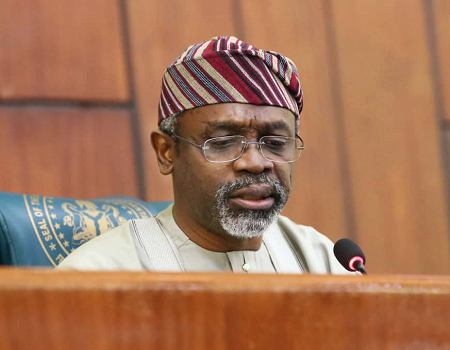The Speaker of the House of Representatives, Hon Femi Gbajabiamila, on Wednesday, reiterated the House resolve to pass the Petroleum Industry Bill (PIB) into law by April 2021.
Hon Gbajabiamila gave the assurance at the opening of the two-day public hearing organised by the Ad-hoc Committee on PIB, during which members of the Oil Producers Trade Section (OPTS) and representatives of the Host Communities expressed divergent views on the proposed 2.5 per cent operating surplus contribution by the operators.
While noting that the bill has suffered major setbacks over the past 20 years sure to contending and vested interests, Hon Gbajabiamila who assured that the inputs of all interest groups will be captured, but added that, the citizen’s well-being would be prioritised.
“We are in a world, an economic world, so there must be interest groups, they will be interest groups and we cannot deny that. But what should guide the outcome of what we do here as we accommodate more views will be what will be in the best interest of the people.
“More importantly, we intend to pass this Bill by April. That is a commitment we have made. Some may call it a tall order, but we will do it and we will do it with every sense of responsibility without compromising the thoroughness of the work that will be done.
“It is important that we all, whether we participant or we do not participate, we are all fully engage because the outcome of this particular bill will determine a lot of things because it is the foundation upon which our economy, the foundation upon which the so much talked about diversification of the economy will be made, because for you to diversify your economy, you have to invest money, and for you to invest money, the resources you would use to invest and develop your economy, as it is in Nigeria for now, comes from the petroleum industry.
“Whether you believe in the finite or infiniteness of the product, the point that needs to be made is that we need to derive as much profit for the time when the product is still available. We need to derive as much profit to be able to diversify into other areas,” the Speaker stressed.
Also speaking, the Minister of State for Petroleum Resources, Timipre Silva, expressed optimism that the bill will establish good governance, competitiveness, global best practices and the ease of doing business within the Nigerian oil sector; guarantee early revenues for the government, clarify roles and simplify the administration of this sector, infuse transparency in regulation, ensure equity and fairness for all industry players and mandate the role space responsiveness of regulators.
Specifically, the Bill seeks to achieve the following objectives: Promote economic growth to increase oil and gas production, stimulate economic growth through strong investments in midstream gas infrastructure to increase gas-based oil generation and industries, enable frontier exploration and establish an effective management system.
“It also aims to infuse transparency and non-confidentiality, transform NNPC into a viable commercially based and self-sustaining national oil company, institute a strong regulatory framework with increased emphasis on mid-stream development, create and effective mid-stream and downstream licensing system, mandate improved environmental measures and assist host communities in petroleum operation areas to achieve their aspirations.”
In his remarks, Group Managing Director, Nigerian National Petroleum Corporation (NNPC), Mele Kyari, who posited that oil will still be relevant in the next 30 years, with the demand to the tune of 100 billion barrels within the same period, while acknowledging that the uses would be changed.
He, however, observed that the only countries that would survive the situation are countries where we have the most effective process will survive, just as it is applicable to coal resources, adding that every decision to be taken in the oil and gas industry must have visibility of at least 30 years of stability.
“The moment you say you are going to change your rules, you’ve introduced uncertainty. Therefore, every decision we introduce in this industry must have the visibility of at least 30 years of stability. But the moment you can’t see this in this industry, nobody invests appropriately.”
While noting that Nigeria has not seen any significant investment in the industry since the year 2000, due to lack of fiscal stability in our country and other factors, including lack of access to long term loan facility.
ALSO READ: PHOTOS: The message Buhari gave us after meeting him–New CDS
On his part, Chairman, Federal Inland Revenue Service (FIRS), Mohammed Nami, expressed optimism that the proposed PIB, when passed into law, will change the entire administration, governance and fiscal landscape of the oil and gas industry.
He further observed that the bill will help to jumpstart the much-needed revolution in Nigeria’s gas empire, promote economic growth with a strong framework for strong investment in infrastructure, and change the fiscal regime, hydrocarbon and company income tax.
In his address, Chairman, Ad-hoc Committee on PIB, Hon Mohammed Monguno, who lamented that Nigeria’s oil industry operates in a global environment that is constantly shifting in favour of countries with the most competitive, accommodating legislative instruments, affirmed that “the absence of these factors has resulted to loss of the significant amount of investments.
“In an effort to address the present state of the quagmire in our oil and gas industry, we must put in place a legislative instrument such as this, which establishes a fiscal framework to boost oil and gas output, enhance sector attractiveness for international investors.
”This will increase foreign direct investment, which will undoubtedly catalyse Nigeria‘s economic recovery. It also places a strong emphasis on developing a domestic gas market in Nigeria by providing measures to encourage companies to explore and produce gas from discoveries, as well as a framework for gas tariffs and delivery.
“The bill when passed into law will promote economic growth and make the petroleum sector competitive. FIRS is in total support to develop the oil and gas industry in line with the international best practices,” he said.
In his presentation, representative of Total Nigeria, Mr Victor Bamidele, expressed concern over uncertainties over the fiscal environment arising from the Deep Offshore & Inland Basin Production Sharing Contract Amendment Act (DOAA), 2019, the Finance Act in 2020, and versions of the PIB that have negatively affected investor sentiment. According to him, between 2015 and 2019, Nigeria attracted only 4per cent of the $70 billion committed to Africa’s oil and gas industry despite having the largest reserves in Sub-Saharan Africa and several giant fields remain unsanctioned.
While stressing the need to ensure that the PIB should address these concerns, Bamidele noted that: “if the fiscal and cost environment in Nigeria is not competitive and fit to meet this challenge, then the country’s world-class resources may remain stranded if the Bill does not incentivize future investments.
“The governance and administrative reforms in the Bill are far-reaching and ambitious. Total, as a member of OPTS, fully supports the collective industry commentary on the proposed terms as detailed in the OPTS Memorandum submitted to the Committee and will not comment further herein.”
Reps to pass PIB into law in April ― Gbajabiamila






